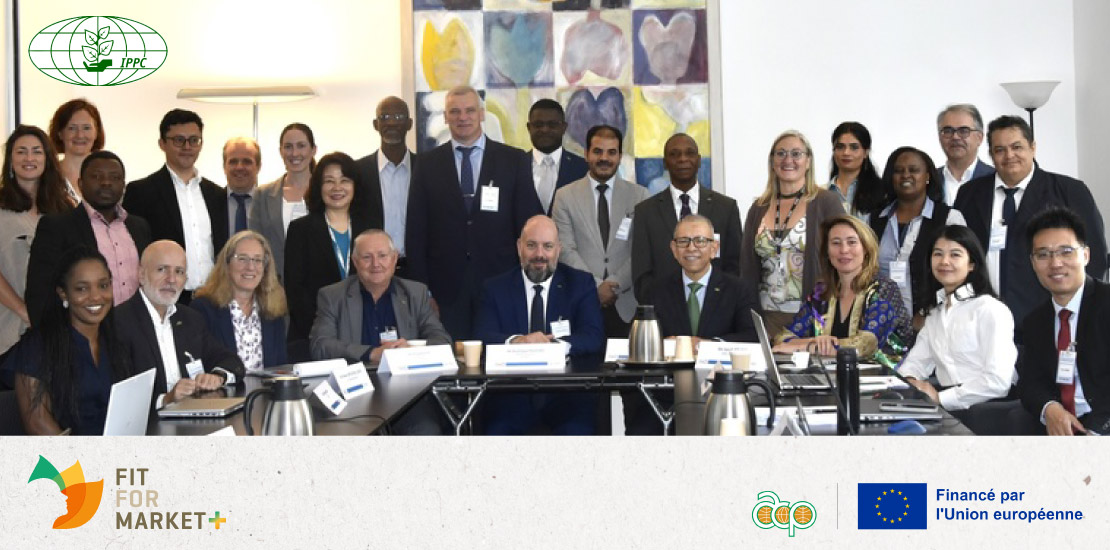- 01/07/2024
- Posted by: Sandra Borma
- Category: News

Continued strengthening of the technical capacity of the contracting parties to adopt the IPPC effectively and efficiently.
The Implementation and Capacity Development Committee (IC) met from 13-17 May 2024 in Rome, Italy, to discuss strategies of enhancing the technical capacity of contracting parties to effectively and efficiently adopt the International Plant Protection Convention (IPPC) and implement plant health standards. The IC is one of the subsidiary bodies of the Commission on Phytosanitary Measures (CPM), the IPPC’s main governing body.
The IC discussed decisions of the Eighteenth Session of CPM (CPM-18), related to the IC’s work plan and follow-up actions. Proposed interventions are expected to enhance effectiveness in implementing the convention and improve future strategies and actions.
One of the key issues was the need for adequate and sustainable funding for implementation and capacity-development (CD) activities as well as development and delivery of priority CD materials and resources such as guides and training materials. Sustainable funding would also ensure continuity of IPPC flagship projects such as the Phytosanitary Capacity Evaluation (PCE), the global coordination on Fusarium TR4 and IPPC Observatory activities.
The IC acknowledged the comprehensive report from the secretariat on ongoing PCEs, aligned with the PCE Strategy 2020-2030, and the plan to modernize PCEs. The IC agreed on a set of actions to enhance the user-friendliness, reliability and effectiveness of the tool. Conducting PCEs has led to improved technical capacity in several countries’ national plant protection organizations (NPPOs) and enhanced phytosanitary infrastructure for better IPPC implementation.
The IC also reviewed the Development Agenda Items (DAIs) of the IPPC Strategic Framework which it oversees: harmonization of electronic data exchange, management of courier and mail pathways, developing guidance for the use of third-party entities, as well as pest outbreak alert and response systems. The DAIs reflect global changes that impact national, regional and global plant protection organizations and present opportunities for innovation, collaboration, research, standard setting and capacity development in emerging plant health areas.
Osama El-Lissy, IPPC Secretary commended the IC for facilitating the effective implementation of the IPPC. He highlighted the contribution of the IC and the Implementation and Facilitation Unit, in strengthening plant health and safe trade through the IPPC ePhyto Solution and awareness creation about e-commerce as a pathway for pest spread.
“The role of the IC is essential for the IPPC Community. Without capacity development materials, ISPMs would be challenging for NPPOs to implement,” he said.
The Standard Setting Unit and the Integration Support Team of the IPPC Secretariat updated the IC on various topics, including preparations for CPM-19 and the 2024 IPPC Regional Workshops, International Day of Plant Health observance, and outcomes of the Standards Committee (SC) meeting in May 2024. To facilitate prioritization of relevant ICD topics, the IC invited the SC to regularly share issues concerning implementation, identified by the SC and Expert Working Groups.
The IC Team for Submission of Implementation Topics presented updated and simplified submission forms for implementation topics and the IPPC Observatory to streamline the topic submission process and enhance user-friendliness. The IC approved the revisions and recommended them for submission to the Task Force on Topics for use in the 2025 call for topics.
The meeting also addressed ongoing development of IPPC CD materials and their increased promotion among contracting parties, creation of a new digital learning platform with extra eLearning courses, and engagement of IC members in the 2024 IPPC Regional Workshops. The IC stressed the significance of promoting the ICD materials at the workshops, recognizing implementation issues and gathering valuable feedback from contracting parties.
Observers from the European Commission, Comité de Liaison Entrepreneuriat Agriculture Développement (COLEAD), and the Standards and Trade Development Facility Secretariat (STDF), shared their work in phytosanitary capacity evaluation, common activities with the IPPC Secretariat, and discussed potential future collaborations. The IC expressed gratitude for their presentation and ongoing support, emphasizing the value of knowledge exchange.
The IC meeting report is available here.
(Source of the article : IPPC)
This activity is supported by the Fit For Market Plus (FFM+) programme, implemented by COLEAD within the Framework of Development Cooperation between the Organisation of African, Caribbean and Pacific States (OACPS) and the European Union. This publication receives financial support from the European Union and the OACPS. The content of this publication is the sole responsibility of COLEAD and can in no way be taken to reflect the views of the European Union or the OACPS.





